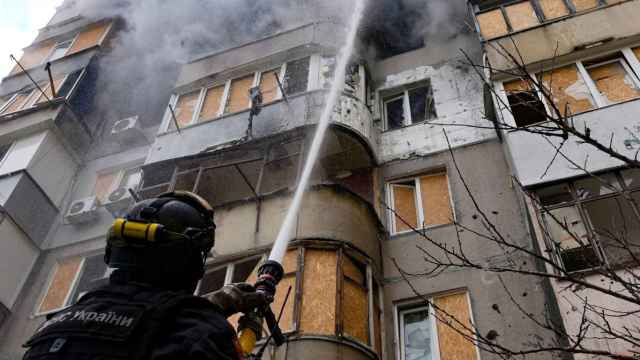Russia’s record heat wave and worst drought in 50 years may spur inflation and make economic growth more reliant on state support as factories suspend production and consumer demand slows.
“The impact of the drought on harvest and grain prices will be material, causing annual 2010 inflation to reach 7 to 7.5 percent versus our previous estimate of 6.3 percent,” Natasha Zagvozdina and Ulyana Lenvalskaya, analysts at Renaissance Capital, said in a note Thursday.
The drought and heat are fueling fires that have killed at least 50 people and scorched 712,412 hectares, an area about three times the size of Luxembourg, the Emergency Situations Ministry said in an e-mailed statement. Emergency crews are battling 589 fires on 195,834 hectares, the ministry said.
Agriculture is the hardest hit part of the economy, with the government declaring states of emergency in 28 crop-producing regions and grain yields down 20 percent so far this year. Agriculture accounts for about 4 percent of gross domestic product, according to VTB Capital.
The Perm region in the Urals declared a drought emergency Thursday and said as much as 40 percent of the grain crop and 45 percent of the potato harvest may be lost, according to a statement on the local government’s web site.
Companies that will be “negatively affected” include Wimm-Bill-Dann, Russia’s biggest dairy producer; Cherkizovo, the biggest poultry producer; and “to a lesser extent” vodka producers such as Synergy, Renaissance Capital said.
Prices for wheat and barley fodder jumped about 50 percent and 80 percent, respectively, last month, and if these “pressures linger, meat producers would have to defend their margins and hike prices,” VTB Capital analysts Alexandra Yevtifyeva and Ivan Kushch said in an e-mailed note.
Higher grain prices may add as much as 1.7 percentage points to the inflation rate this year, Natalya Orlova, chief economist at Alfa Bank, said Wednesday. Annual price-growth slowed to 5.5 percent in July, the lowest level on record.
The drought, which caused the biggest jump in wheat prices since 1973, will continue this month, threatening more crops and winter-grain sowings, according to the state weather service. Rainfall last month in central Russia and along the Volga River, the areas hardest hit by fires, was 10 percent to 30 percent of the long-term average, the center said.
The government forecasts annual inflation at 6 percent to 7 percent this year and 5 percent to 6 percent in 2011. Yaroslav Lissovolik, head of research for Deutsche Bank in Moscow, estimates that inflation may accelerate to 8.1 percent by the end of this year.
Higher inflation will eat into real wage growth, which means lower consumer demand, Alfa’s Orlova said. The importance of government stimulus, such as financing to help people rebuild homes destroyed by fires, will increase relative to consumer demand as a driver of economic expansion, she said.
“We might not see a negative effect in terms of end-of-year growth figures,” Orlova said. “But a negative change in the structure of the economy will be obvious.”
The government has pledged 5 billion rubles ($170 million) to rebuild homes destroyed by the fires, in addition to paying 200,000 rubles to each person who loses a property, Prime Minister Vladimir Putin said Aug. 2. Nonworking pensioners affected by the blazes will receive 25,000 rubles from the Pension Fund.
Putin said Wednesday that about 2,000 houses had been destroyed by fires this year and about 4,000 people left homeless, RIA-Novosti reported.
Expansion of service industries, from hotels to supermarkets, slowed in July, partly because of the heat wave, according to VTB Capital’s Purchasing Managers Index.
Industrial output may suffer in August because of the extreme weather, especially as some automakers temporarily halt production, according to VTB Capital. AvtoVAZ suspended operations through Aug. 8 because of extreme heat in Tolyatti.
Temperatures in most parts of central Russia will be 8 degrees Celsius above average through Aug. 12, rising as high as 42 C, according to the state weather service. “High” or “extreme” fire danger will persist in the Central and Volga federal districts, where most wildfires are burning, at least until Thursday, the service said.
“Estimates of the crop damage caused by the drought in Russia have escalated over the past two weeks,” VTB Capital said. “Adding in higher budget spending, this means that the inflation risks for 2011 have mounted.”
Federal Anti-Monopoly Service chief Igor Artemyev ordered his agency to monitor prices more closely to avoid “unwarranted” increases in the cost of food during the drought, according to a statement Wednesday on the service's web site.
Russia has 21.5 million tons of grain stockpiles, including 9.5 million tons of government inventories, Deputy Agriculture Minister Alexander Belyayev said Aug. 3.
“At present, grain inventories are sufficient to restrain inflation, but it is too early to judge the extent and the cost burden” of the drought, Troika Dialog said Wednesday. “One thing is clear: There will be some sort of negative cost impact in third quarter of 2010 for the consumer space.”
A Message from The Moscow Times:
Dear readers,
We are facing unprecedented challenges. Russia's Prosecutor General's Office has designated The Moscow Times as an "undesirable" organization, criminalizing our work and putting our staff at risk of prosecution. This follows our earlier unjust labeling as a "foreign agent."
These actions are direct attempts to silence independent journalism in Russia. The authorities claim our work "discredits the decisions of the Russian leadership." We see things differently: we strive to provide accurate, unbiased reporting on Russia.
We, the journalists of The Moscow Times, refuse to be silenced. But to continue our work, we need your help.
Your support, no matter how small, makes a world of difference. If you can, please support us monthly starting from just $2. It's quick to set up, and every contribution makes a significant impact.
By supporting The Moscow Times, you're defending open, independent journalism in the face of repression. Thank you for standing with us.
Remind me later.





